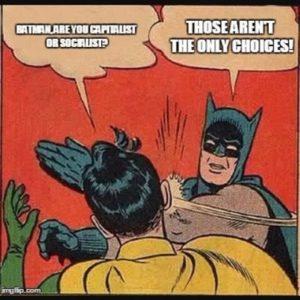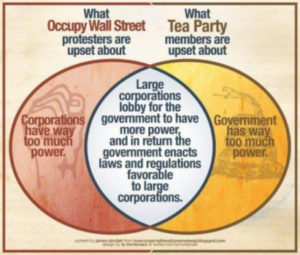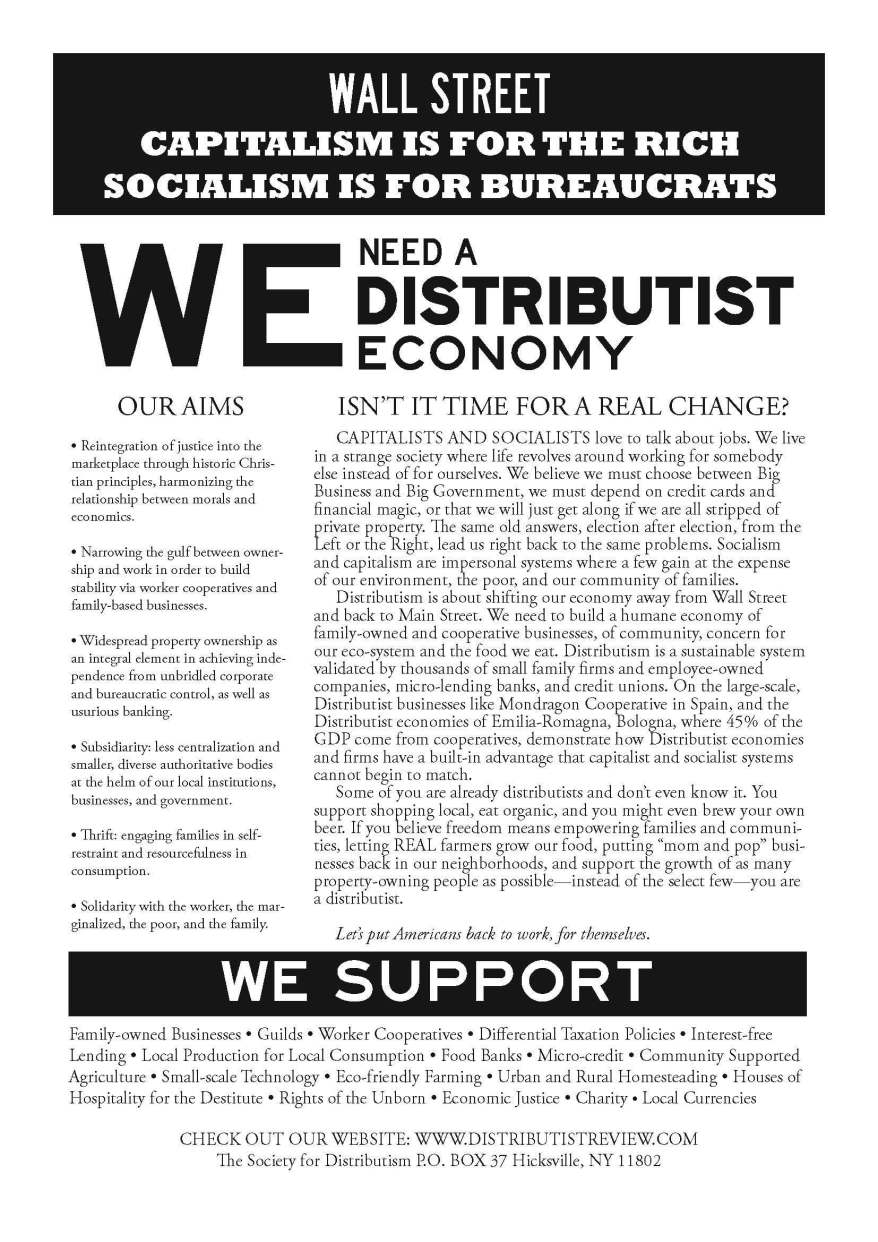Gods And Radicals: Neither Capitalism Nor Socialism: A Third Alternative
by John Halstead | August 24, 2016
In the lead up to Earth Day this year, I wrote a 21-part series of posts offering practical suggestions for how to honor the Earth beyond the standard ideas of planting a tree and picking up litter (both of which are good, but insufficient). (You can see the list here.)
Number 6 was “Fight Capitalism.” I wrote:
“Our capitalist economic system is fundamentally incompatible with a healthy planetary ecosystem. We live on a planet with finite resources, but our economic system is premised on infinite growth. And since we can’t change the laws of nature, we must change our economic system. This means challenging some of our most cherished myths …
We can unlearn capitalist ways of thinking. Capitalism infects all of our relationships: with other people, with other-than-human beings, and with the Earth. … Think about your relationship to the place you live. Is it a place you ‘use’, or is it a world you inhabit, cherish, and care for? We learned these ways of thinking, and we can unlearn them.”
One of the commenters asked me what we are to replace capitalism with. It’s a common question that I hear in response to critiques of capitalism. The reason why people ask this so often is because capitalism has so colonized our minds that we are incapable of imagining alternatives.
Capitalism ≠ Markets
 One point of confusion is that capitalism has been conflated with markets People think that capitalism means people buying and selling things. But that’s a “market.” And there can be markets without capitalism.
One point of confusion is that capitalism has been conflated with markets People think that capitalism means people buying and selling things. But that’s a “market.” And there can be markets without capitalism.
What is capitalism then? A capitalist society is a market society in which the concentration of wealth in a small percentage of the population. A capitalist society is divided into two classes: the capitalist class, which owns the means of production, and the working class, which must sell their labor to survive. The government protects and perpetuate this division through creation and enforcement of laws like limitations on liability of corporations, protection of usury (lending with interest), and free trade agreements.
The Problem With Capitalism
The capitalist class exploits the working class by living off their labor and reinvesting profits to create more profits, which are not shared with the working class. The members of the working class have no real power in this system, because their only options are to accept the terms of employment by the capitalist class or starve. This is where the term “wage slavery” comes from.” Workers put up with this because they believe they are all “temporarily embarrassed millionaires”. In other words, they have bought into the promise of the American Dream. But the natural outcome of a capitalist society is the increasing consolidation of property in the hands of an ever shrinking capitalist class and an ever growing class of people who earn just enough to survive (or not enough to survive) — exactly what we are witnessing today.
But this division of society between capitalists and workers is not necessary for markets, or for buying and selling, to exist. There are other kinds of market economies than capitalism. Some people think the only alternative to capitalism is Society-style communism — which they believe was debunked with the fall of the USSR — or socialism — which they see as a slippery slope to Soviet-style communism. The truth is that there are many alternatives to capitalism. Communism and socialism are just two.* Distributism is another.
Distributism’s Origins
A little history: Distributism has its roots in Catholic social theory, starting with Pope Leo XIII’s encyclical “Rerum Novarum” (“Rights and Duties of Capital and Labor”), which published in 1891, in the wake of the rise of capitalism and industrialization, as well as the socialist and communist reactions to these. In the encyclical, Pope Leo called attention to the poverty of the majority of the working class. He supported the rights of the working class to organize and form unions for purpose of collective bargaining, in lieu of state intervention. He rejected both capitalism and socialism. And he affirmed the right to private property.
These ideas were later supplemented by other Popes, including Pope Pius XI’s Quadragesimo anon in 1931, Pope John XXIII’s Mater et magistrate in 1961, and Pope John Paul II’s Centesimus annus (1991). (Distributist ideas also can be found in Pope Francis’s recent encyclical on the environment. ) The ideas in these documents were taken up by British authors G.K. Chesterton and Hilaire Belloc, who formed them into a coherent system called “distributism.” It was eventually adopted by leaders of the Catholic Worker Movement like Dorothy Day. Although distributism began as a Catholic idea, distributism’s later supporters were not necessarily Catholic.
What is Distributism?
 Distributism is not a middle ground between capitalism and socialism. Rather, it rejects both capitalism and socialism, which it sees as flips sides of the same coin. From the distributist perspective, capitalism inevitably leads to the concentration of power in big businesses who hold monopolies and exploit workers, consumers, and the environment. On the other hand, socialism also leads to a concentration of power, but in the hands of big government and a political elite. This concentration of power, either in big business or big government, has the same effect of disempowering the majority of people. Distributism sees capitalism and socialism, big business and big government, as mutually reinforcing, one leading to the other hand back again in a vicious cycle. (The military-industrial complex has many analogues.) Distributism seeks a third way: instead of big business or big government, we would have “big community”.
Distributism is not a middle ground between capitalism and socialism. Rather, it rejects both capitalism and socialism, which it sees as flips sides of the same coin. From the distributist perspective, capitalism inevitably leads to the concentration of power in big businesses who hold monopolies and exploit workers, consumers, and the environment. On the other hand, socialism also leads to a concentration of power, but in the hands of big government and a political elite. This concentration of power, either in big business or big government, has the same effect of disempowering the majority of people. Distributism sees capitalism and socialism, big business and big government, as mutually reinforcing, one leading to the other hand back again in a vicious cycle. (The military-industrial complex has many analogues.) Distributism seeks a third way: instead of big business or big government, we would have “big community”.
Distributism sees economics as a subset of ethics. Thomas Storck explains in “Capitalism and Distributism: Two Systems at War,”
“Distributism seeks to subordinate economic activity to human life as a whole, to our spiritual life, our intellectual life, our family life. It does not regard the mere production of goods, still less the acquisition of wealth, as ends in themselves.”
Our current capitalist system turns this on its head and renders everything — the family, religion, even our bodies — subordinate to the production of wealth for the capitalist class. In a distributist economy, the economy is made to serve the needs — both material and spiritual — of all human beings.
Small is Beautiful
The motto of a distributism is “Small is Beautiful”. Distributism favors the small and the local. A fundamental concept in distributism is “subsidiarity,” the idea any activity of economic production should be performed by the smallest possible unit — down to the family.
Another important concept is “solidarity” or “solidarism”, the recognition of our interconnectedness. Thus, it is the family, not the individual, that is the core of distributist society. The family is understood as connected to other families through social and biological bonds, and to the whole human family, as well as all life on earth.
In the distributist ideal, the family is in control of the means of production. No larger unit should perform a function which can be performed by a smaller unit. Thus, distributism favors anti-trust legislation that breaks up monopolies and concentration of market power in one or only a few companies. As G.K. Chesterton wrote,
“Too much capitalism does not mean too many capitalists, but too few capitalists.”
Distributism affirms private property, but rejects its consolidation in the hands of an elite — the 1%. Instead, it advocates distributing (hence the name) property ownership as widely as possible. Note, this is different from re-distributing income. Distributists believe that, when people own the land on which they work and from which they and their families benefit, they work harder and take greater care of the earth.
What Does A Distributist Society Look Like?
So what would a distributist society look like? Well, Private property would still exist, but most property would be owned by families. Small, family-owned farms and artisan businesses would produce most goods. Most people would grow at least some of their own food, and the rest would be produced as locally as possible.
Most people would be able to earn a living without having to rely on the property of others. Farmers would own their own land, artisans would own their own tools, and so on. There would be markets and competition, but instead of mass production and cheap poor quality goods with built-in obsolescence, local artisans would create high quality products with the expectation that they would be repaired when they broke, not tossed in the trash.
Co-operatives of families and guilds (rather than unions) of workers would exist, but anti-trust and tax laws would prevent companies from growing too big. Where monopolies are necessary, such as public utilities, they would be owned publicly and locally. Local credit unions would replace big banks. Social security would be provided by mutual aid societies. The federal government would exist to provide mutual defense, ensure that human rights are respected, and foster cooperation among smaller political units.
Distributism: A Pagan Ideal?
I’m not an expert on economic matters by any means, so I welcome constructive critiques of the ideas I’ve shared here. Although it has its roots in Catholic social theory, I think distributism has a lot in common with Pagan critiques of capitalist society I’ve seen here at G&R and elsewhere. I expect the “small is beautiful” concept will resonate with a lot of Pagans. I’d like to see more discussion — both pro and con — of distributism as an alternative to capitalism (and socialism) on Pagan blogs and in Pagan forums. So share your comments below, or write your own post in response.
Some Distributist Resources
“Distributism Basics” by David W. Cooney
- A Brief Introduction
- Distributist Economic Society
- Distributism vs. Capitalism
- Distributism vs. Socialism
- The Nature and Roles of Government
- The Science of Economics
- What’s Wrong With Capitalism
The Distributist Review
- “An Introduction to Distributism” by John Médaille
- “Distributism: Economics As If People Mattered” by Peter Chojnowski
- “A Parallel Economy” by Peter Chojnowski
Colin Kovarik (10 minute slideshow)

[…] thing extra akin to “freedom” or “heat, good, blissful emotions of positivity.” Capitalism isn’t the same as merely having markets or participating in commerce. Though components of capitalism are evident […]
[…] something more akin to “freedom” or “warm, good, happy feelings of positivity.” Capitalism isn’t the same as simply having markets or engaging in trade. Although elements of capitalism are evident in, say, […]